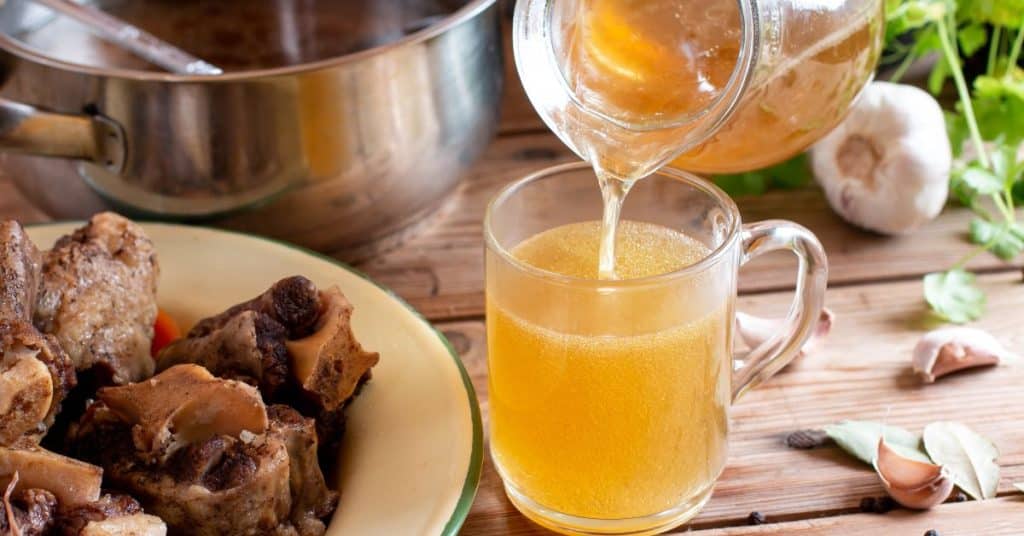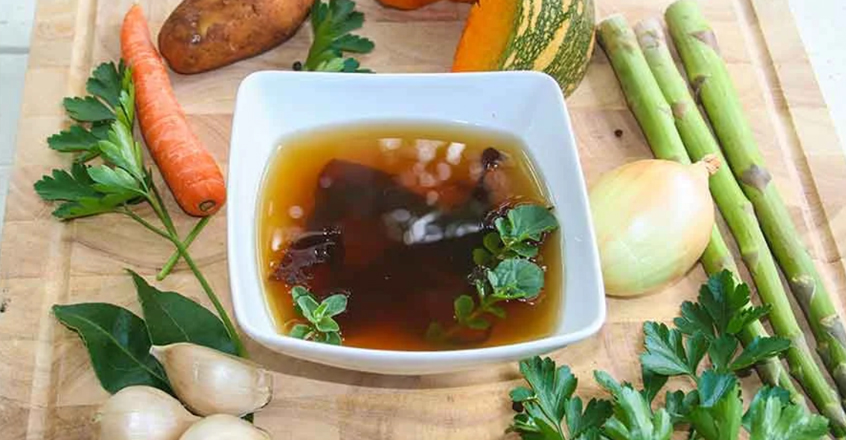

Bone broth is prepared by boiling animals’ bones and connective tissues in water with herbs, spices, and, sometimes, small amounts of vegetables.
Although broth, including bone broth, is typically used as a flavorful base for soups and stews or as a palate cleanser or beverage, proponents of bone broth suggest that it provides numerous health benefits such as aiding digestive issues, boosting the immune system, and much more. Bone broth is often recommended as part of the gut and psychology syndrome (GAPS) diet, which is often used for various ailments such as autism and attention-deficit hyperactivity disorder (ADHD), and as part of the paleolithic diet.
Is Bone Broth Good for You?
The purported health benefits are ascribed to the contents of the broth that are leached from the boiled bones, including collagen, bone marrow, amino acids, and minerals. These components are extracted through slow cooking and sometimes by adding acids such as vinegar or wine, which can help loosen and dissolve bits of bones and connective tissues.
Bone broth does contain collagen and bone marrow, but the claim that consuming these will directly benefit human bones and joints is unfounded. When humans consume collagen, it is broken down into individual amino acids, minerals, etc. These amino acids and minerals may then act like any other amino acid or mineral consumed; however, there is no evidence of an advantage to consuming amino acids and minerals from bone broth as opposed to from other foods.
Research about Bone Broth
Despite its popularity and the numerous claims of its medicinal properties, there is very little scientific research regarding bone broth. I searched the scientific literature and could only find a few relevant studies. The earliest study available is from 1934, published in the journal Archives of Disease in Childhood. The research was conducted by Elsie Widdowson (British dietitian) and Professor Robert McCance (North Irish pediatrician) who made numerous early, vital contributions to the field of nutrition science. This research analyzed the nutritional composition of bone broth and bone and vegetable broth. It was found that bone broth was a poor source of many nutrients, yet the addition of vegetables increased the content of several essential nutrients: potassium, calcium, magnesium, and iron.[1]
There is a tradition of eating chicken soup, often made using bones, when sick with an infection. Similar to bone broth, there is little research regarding chicken soup and infection. However, a 1978 study found that chicken soup was better than cold or hot water at moving nasal mucus.[2] A subsequent small study conducted by researchers from Nebraska Medical Center and published in a leading medical journal in 2000 (Chest) found that “chicken soup may contain a number of substances with beneficial medicinal activity.” The researchers observed that people eating chicken soup seemed to experience a mild reduction in inflammation that helped reduce symptoms of respiratory infection. However, the actual chicken soup used in this study contained a large proportion of vegetables (onion, sweet potato, parsnip, turnip, carrot, celery, and parsley).[3]
In January 2016, Time magazine ran an article titled: “Science Can’t Explain Why Everyone is Drinking Bone Broth.”[4] This article included excerpts from interviews with respected scientists. William Percy, an associate professor at the University of South Dakota Sanford School of Medicine, states that “since we don’t absorb collagen whole, the idea that eating collagen somehow promotes bone growth is just wishful thinking. The idea that because bone broth or stock contains collagen it somehow translates to collagen in the human body is nonsensical. Collagen is actually a pretty poor source of amino acids.” Further, Dr. Kantha Shelke, food scientist, spokesperson for the Institute of Food Technologists, and a principal with the food science and research firm Corvus Blue LLC, says, “Eating a diet rich in leafy green vegetables is ideal. Plants offer richer sources in collagen building blocks and, in addition, provide nutrients not found in sufficient quantities in meats or broth.”
Is Bone Broth Harmful?
So, there is a lack of research regarding bone broth, and the available research is not groundbreaking. But is that the whole story? Might bone broth have some potentially dangerous contents?
Bones are known to store heavy metals, particularly lead. When bone broth is prepared, lead may be released. In 2013, UK scientists conducted a small study on the lead content of bone broth made from chicken bones. The broth contained over 10 times more lead than the water alone. Interestingly, the chicken bones in this study were derived from organic animals, and the skin and cartilage contributed the highest amount of lead.[5]
Similar to the 1934 study, a 2017 study published in Food and Nutrition Research reported that bone broth was a poor source of calcium and magnesium. In contrast to the 2013 study, however, this more recent study reported low lead and cadmium content in bone broth, indicating some variability in the metal content of bone broth. This makes sense. The nutritional content and the health effects of various bone broths would logically be influenced heavily by their core ingredients and different preparation methods.[6] Therefore, broad claims about bone broth are likely to be misleading.
In short, the best we can say from the limited research is that traditional bone broth appears to be a poor source of nutrients and may even contain harmful components. A healthier choice appears to involve adding vegetables and subtracting bone . . . In other words, vegetable soup!
References
- McCance RA, Sheldon W, Widdowson EM. Bone and vegetable broth. Arch Dis Child. 1934 Aug;9(52):251-8.
- Saketkhoo K, Januszkiewicz A, Sackner MA. Effects of drinking hot water, cold water, and chicken soup on nasal mucus velocity and nasal airflow resistance. Chest. 1978 Oct;74(4):408-10.
- Rennard BO, Ertl RF, Gossman GL, Robbins RA, Rennard SI. Chicken soup inhibits neutrophil chemotaxis in vitro. Chest. 2000 Oct;118(4):1150-7.
- TIME magazine. January 2016. Science Can’t Explain Why Everyone is Drinking Bone Broth. Accessed at: http://time.com/4159156/bone-broth-health-benefits/
- Monro JA, Leon R, Puri BK. The risk of lead contamination in bone broth diets. Med Hypotheses. 2013 Apr;80(4):389-90.
- Hsu DJ, Lee CW, Tsai WC, Chien YC. Essential and toxic metals in animal bone broths. Food Nutr Res. 2017 Jul 18;61(1):1347478.
Copyright 2024 Center for Nutrition Studies. All rights reserved.
Earn Your Plant-Based Nutrition Certificate
Join over 20,000 students who have improved their health, learned new skills, and even inspired career changes.
Program Overview
- 23,000+ students
- 100% online, learn at your own pace
- No prerequisites
- Continuing education credits






